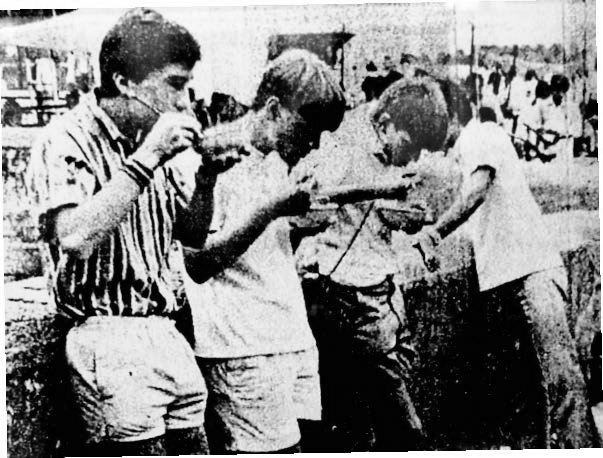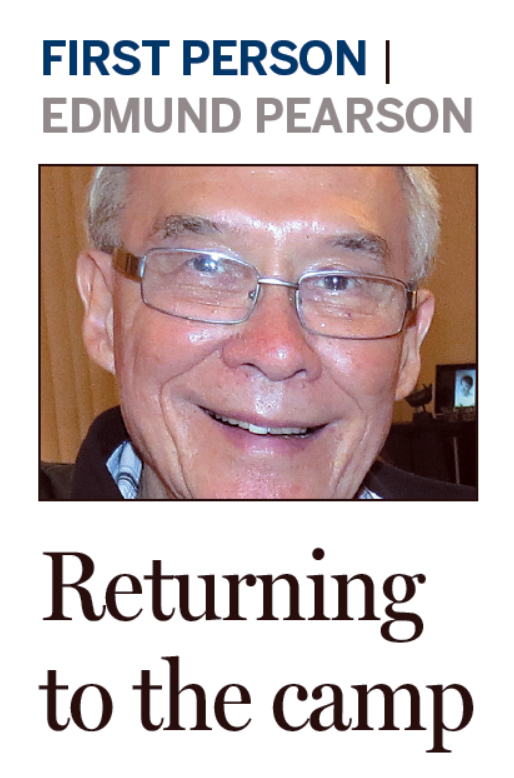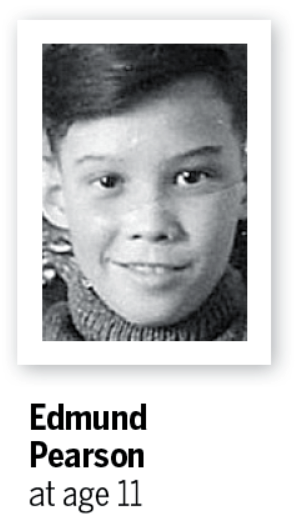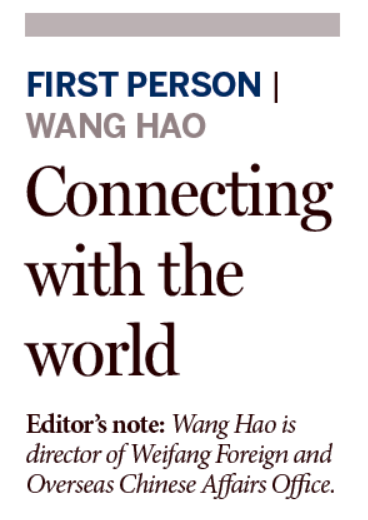
February 20, 2014.


The establishment in Weifang,
known as Weihsien
Concentration Camp, was the
largest Japanese camp in China.
It housed prisoners from
many countries during World
War II. Most of the internees
endured three years there.
Rotten meat
Edmund Pearson, 78, a
retired Canadian engineer and
businessman was among the
internees. Although he was
just 6 years old when he was
interned, he remembers everything.
Fearing the internees could
make contact with the outside
world or even escape, the Japanese
covered the walls with
electrified wires and set up
searchlights and machine guns
in the guard towers. The camp
was under military management
and the internees were
forced to wear armbands displaying
a large black letter to
indicate their nationalities —
“B” for British, “A” for American,
and so on.
“We were there as a family
and lived in a small room with
no sanitary facilities. I have
many memories of the camp,
such as being counted by the
Japanese three times a day,
attending school, being hungry
most of the time. I was 6,
but still had to work. My job
was that of a bell ringer, waking
people for the first roll call.
The latrines were awful because
we moved from flush toilets to
‘squatters’,” Pearson recalled.
“We very seldom had meat,
and when we did it was often
rotten. We had a lot of eggplants,
to the extent that afterward
I could not eat eggplant
until I was in my 30s. As children
we still had school, but
the teenagers also had jobs.
My older brother worked as a
cobbler,” he said. “Coffee and
tea was reused, over and over.
We arrived in late fall, around
October, so our living quarters
were very cold.”
Pearson remembered that
the adults made young children
eat powdered eggshells to prevent
rickets. “They got eggs on
the black market and the shells
had to be saved and powdered.
There’s nothing worse than
eating a spoonful of powdered
eggshell,” he said.
British writer Norman Cliff
was 18 when he entered the
camp. In his memoirs, he said
that every effort was spent
acquiring fuel, food and clothing.
“The fortunes of war produced
some strange situations,”
he wrote. “One fine British Jewish
millionaire could be seen
working regularly through a
pile of ashes behind the kitchen,
and a leading female socialite
could be seen chopping wood.
Our bodies were tired from
long hours of manual labor. We
often went to bed longing for
more food. Two slices of bread
and thin soup were hardly a satisfying
supper after a day spent
pumping water and arraying
heavy crates of food.”

Loss of dignity
Some people have called
Weihsien camp “the Oriental
Auschwitz”.
“Because of the poor sanitary
conditions and the shortages of
food and medical care, several
people died in the camp. But
still I don’t agree with calling it
‘Auschwitz’ because there was
no slaughter there. That’s the
truth. Japan mainly wanted to
humiliate the allied countries,”
said Xia Baoshu, 82, a Weihsien
camp researcher and former
president of Weifang People’s
Hospital.
Mary Taylor Previte, 81,
who later served in the New
Jersey General Assembly, was
interned at the age of 9.
“The second day after the
attack on Pearl Harbor, Japanese
soldiers appeared on the
doorstep of our school. They
said we were now prisoners of
the Japanese. I remember so
well when the Japanese came
and marched the school away
— perhaps 200 teachers, children
and old people — to the
concentration camp. I will
never forget that day. A long,
snaking line of children marching
into the unknown, singing
a song of hope from the Bible,”
she said.
“Separated from our parents,
we found ourselves crammed
into a world of gut-wrenching
hunger, guard dogs, bayonet
drills, prison numbers and
badges, daily roll calls, bed
bugs, flies and unspeakable
sanitation.”
A time of heroes
For Previte, the story of the
camp is one of heroes, hope and
triumph. It shaped her life.
“Weihsien is a story of Chinese
heroes — farmers who
risked their lives to smuggle
food over the wall to prisoners
— we called it the ‘black market’
— and those who brought
us food so generously when the
war was over,” she said.
Xia recalled: “Some peasants
operating the black market
were caught red-handed and
tortured. Some were killed.
The camp was closely guarded.
Apart from the Japanese, only
Zhang Xingtai and his son, who
cleaned the latrines, could enter
and leave the camp freely. They
took many risks to help internees
deliver important messages
and also helped Arthur W.
Hummel (called Heng Anshi
in Chinese) to escape,” he said.
Zhang Xihong, 84, Zhang
Xingtai’s youngest son, remembered
the aftermath. “After
Heng escaped, the Japanese
immediately caught my father
and brother. They were heavily
beaten and tortured, but neither
gave in. They were finally
released because of a lack of evidence.
They came back with
injuries and blood everywhere.
They are heroes in my heart,
because my father never regretted
what he had done,” he said.
Zhang’s story was echoed
by Wang Hao, director of the
Weifang Foreign and Overseas
Chinese Affairs Office.
“The supply of food to the
camp dwindled and the internees
suffered a lot from longterm
hunger. The local people
donated more than $100,000, a
lot of money at that time, to buy
food, medicines and necessities
that they managed to send into
the camp to help the internees
survive the toughest periods,”
he noted.
Hopes of survival
Pearson said the children
were lucky because the adults
quickly formed a camp committee.
They restarted the
school, hospital, and church,
and even set up an entertainment
committee that put on
oratorios, plays and ballets.
Cheng Long, a professor
at the Beijing Language and
Culture University, has just
returned to China from the US
where he interviewed surviving
internees. “The deeper I
research the history, the more
I am interested in it. I found
that even in such harsh conditions,
the internees maintained
a positive attitude toward life.
The Japanese didn’t allow the
band to practice, so instead
of making a sound, they kept
practicing by gestures in the
hope of playing on victory day.
Even under such hardship and
without freedom, their paintings
still featured bright colors
— flowers, green trees and blue
skies,” he said.
The respect shown for education
moved Sylvia Zhang,
a post-doctoral researcher at
Shih Hsin University in Taiwan.
“Even in the camp, the teachers
still followed strict teaching
guidelines just like in Britain.
They held the Oxford Local
Examination in the camp for
higher-grade students to help
them deal with the changeable
future. It’s the reason that many
of the child internees were successful
after liberation,” she said
Previte said that although
children from her school were
separated from their parents,
the missionary teachers and
adults did everything they
could to protect them.
“The teachers would never
let students give up. They insisted
on good manners. We could
be sitting on wooden benches
at wooden tables in the mess
hall and eating the most awfullooking
glop out of a soap dish
or an empty tin can, but those
hero-teachers kept repeating
the rules: Sit up straight. Do not
stuff food in your mouth. Do
not talk while you have food in
your mouth,” she recalled.
Liberation
“The Japanese army was losing
ground in most of China in
1945 and victory was almost
assured, but the news was
blocked. It wasn’t until the US
arranged rescue planes to liberate
the camp on Aug 17, 1945,
that people knew their days in
hell were over,” said Cheng.
Liberation came as a surprise
to Previte. “It was a hot and
windy day. I was sick with an
upset stomach in the hospital
when I heard the drone of an
airplane over the camp. Racing
to the window, I watched
it sweep lower, slowly lower,
and then circle again. It was a
giant plane, emblazoned with
an American star. Beyond the
treetops its belly opened. I
gaped in wonder as giant parachutes
drifted slowly to the
ground. People poured to the
gate to welcome the heroes. All
the internees were celebrating
liberation and we even cut off
pieces of parachutes, and got
their signatures and buttons to
cherish,” she said.
The long years of malnourishment
affected the children’s
physical development. Even
after 70 years, the experience
of the camp can provoke nightmares
among former internees.
Pearson said that after being
so hungry for more than three
years, he will eat almost anything
now.
 “I am obsessed with food,
so I do all the cooking. More
important, the camp experience
made a very strong
impression on me. It took a
long time before I could deal
with the Japanese, even though
as an adult I went to live in
Hong Kong with my family
and had to do business with
the Japanese. The people are
fine, but the government has
never acknowledged what they
did to us,” he said.
“I am obsessed with food,
so I do all the cooking. More
important, the camp experience
made a very strong
impression on me. It took a
long time before I could deal
with the Japanese, even though
as an adult I went to live in
Hong Kong with my family
and had to do business with
the Japanese. The people are
fine, but the government has
never acknowledged what they
did to us,” he said.
Previte said conflict is a
catastrophe that destroys
everything. “War and hate and
violence never open the way to
peace. Weihsien shaped me. I
will carry Weihsien in my heart
forever.”
Contact the author at hena@
chinadaily.com.cn

Of those interned
in the camp, the
only person I am in
contact with is my
cousin who was born there.
As you can imagine, we survivors
were children at the time,
and our parents decamped all
over the world afterwards.
I returned to the camp in
2005, when the city of Weifang
decided to host a week of
meetings for the survivors.
Only
seven
buildings
are left,
one being
a block of
rooms like
the one
in which
I lived,
although
it’s not
the same
one. Even though the buildings
are now surrounded by
the city, I recognized them all,
even those in which the Japanese
lived. I remember one of
them especially well, because
my brother and I would steal
coal from the basement. I also
recognized the hospital where
I had my tonsils removed.
Mostly, my feelings were pride
 at the accuracy of my memory
after all these years.
I was 70 in 2005 and I was
surprised that the city had
built a memorial wall with all
of our names inscribed on it.
at the accuracy of my memory
after all these years.
I was 70 in 2005 and I was
surprised that the city had
built a memorial wall with all
of our names inscribed on it.
Edmund Pearson spoke with
He Na.

I remember one of the US
internees told me that
Weihsien camp is not
only a part of Chinese
history but also a part of US
history too. The unique history
of Weihsien camp has
provided a connection with
the rest of the world.
To allow more people at
home and abroad to know
about this history, including
key events and how people
helped each other to survive
the hard times, the Weifang
government attached great
importance to the investigations
into the history of the
camp. Staff members are in
a race against time to collect
information and stories 70
years after the event because
most of the internees have
died.
Also, the government is
drawing up a long-term plan
for the camp, and we hope to
restore some of the buildings
and to make the few buildings
that still stand into a campthemed
memorial park.
Next year will be the 70th
anniversary of the end of World
War II, and a series of memorial
activities will be carried out.
One of the most important will
invite survivors to return to
Weifang, where seminars will
be held to further study the
period.
Wang Hao spoke with He Na.